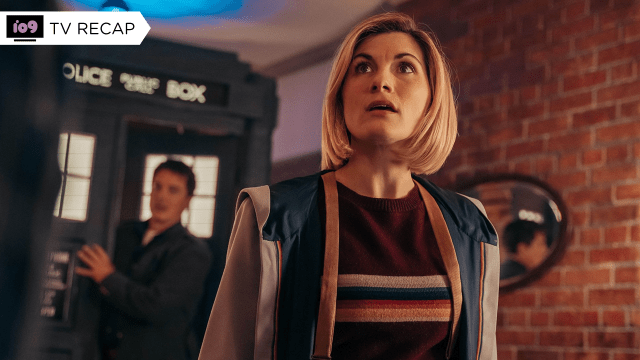Or maybe especially if you’re a Dalek.

“Revolution of the Daleks” does, well, exactly what it says on the TARDIS-shaped tin. It’s a story of revolution, giving us a brand new kind of Dalek — Earth-grown thanks to a disconcerting combination of the fallout of keeping last year’s New Year special hush-hush and the return of Chris Noth’s seedy Trumpian analogue Jack Robertson from 2018’s “Arachnids in the UK.” It’s also a Dalek story through and through, and just as writer-showrunner Chris Chibnall proved in “Resolution,” he knows how to write a solid, by-the-book one of those: there’s no real interrogation of who the Daleks are and their relationship to the Doctor here; that’s by and large out of the way now that Jodie Whittaker has already learned how to stare down a sinister eyestalk. They’re here, they’re angry space bigots, and they’re gonna hover around and shoot death beams and yell “EX-TER-MIN-AAATE.”
[referenced id=”1143812″ url=”https://gizmodo.com.au/2019/01/doctor-who-news-years-day-special-recap-and-the-rejuvenation-of-the-daleks/” thumb=”https://gizmodo.com.au/wp-content/uploads/2019/01/03/ay4ywy4fj7zsbhp68byv.png” title=”Doctor Who And The Rejuvenation Of The Daleks” excerpt=”In the nearly 14 years Doctor Who has been back on TV, the Daleks have been built up as the most fearsome army in Time and Space, and then broken down to a Dalek represents. But Doctor Who’s New Year’s special brought them right back to 2005’s “Dalek” — and finally nailed…”]
Which is good! One of the biggest struggles Chibnall’s era of Doctor Who has faced has been how much it wants to be the kind of different, commentary-heavy, sci-fi-as-parallel show that his and Whittaker’s first season leaned on, and the more traditionally Doctor Who-y adventure storytelling (and self-referential) angles that came to the fore in their second and most recent season. “Revolution” strikes the balance between those selves well, for the most part.
Robertson’s return, and the way he worms himself into the UK’s political standing — via Technology Secretary turned Prime Minister Jo Patterson (Harriet Walter) — feels very much in the vein of Chibnall commenting on the current Conservative government, in its penchant for corporate greed and backdoor influences where policy favours the personal wealth of its cabinet members. Patterson’s eventual and complete inability to handle the crisis of a new Dalek civil war — when Robertson’s neo-Dalek security drones go rogue and fashion themselves a new faction the Doctor promptly sics the rest of Dalek-kind on — reading like a thinly veiled look at Boris Johnson’s own bumbling through the ongoing coronavirus pandemic.
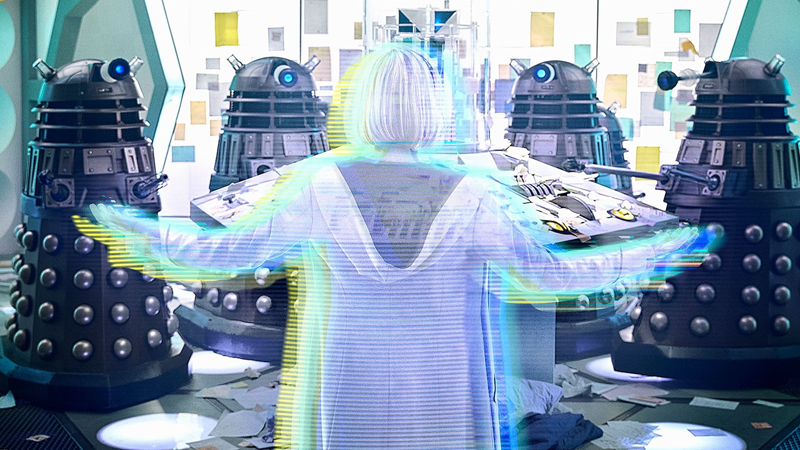
But then there’s those Daleks! And there’s Captain Jack (the returning, yet again, John Barrowman) back to rescue the Doctor out of the prison she was trapped in at the climax of last season, itself filled with old Doctor Who monsters! There’s a dodgy time/space bubble escape! References to old companions! Explosions, and TARDISes, and Dalek ships, and Daleks flying out of those ships and into those TARDISes, and all that whizzbang adventure fun. Even though big things do happen in “Revolution” that play off things from the last season, and will have big ramifications going into the next, it’s the kind of episode that’s perfect for these one-off holiday specials pitched at a larger audience that’s not following along. Everyone, regardless of which approach they like, gets a bit of what they want, and it turns out a bit of what they want is actually Jodie Whittaker cackling with delight as her Doctor blows a ton of Daleks up with a last-minute arse-pull of a plan.
That said, what makes “Revolution” really work is that beneath these two different schools of Who that Chibnall is playing with here, it’s truly an episode about one of the most Doctor Who things of all: how we all react to the very idea of change itself.
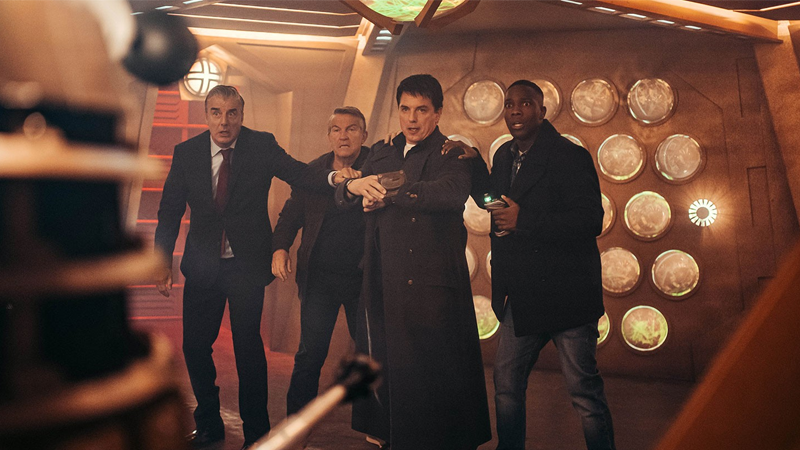
On the big picture level, you have the Daleks themselves reacting to this in a suitably Dalek way, in that they hate it. The only reason the Doctor’s plan in drawing a Dalek death squad to Earth works is that she knows their blind hate will only see the new Daleks inadvertently created by Robertson’s drone program — clones from the DNA remnants of the Recon Dalek from “Resolution” — as a genetic impurity that must be purged. If the Daleks had rolled with their new, sleek-looking gunmetal selves and embraced that change, they would’ve done a bang-up job of subjugating the Earth, considering the “Drone” Daleks were doing quite all right murdering people all over the place. On the “villains” side you also have Robertson, who perfectly adapts to change in turn, worming his way out of scandal after scandal to not just survive, but make out with his reputation intact again, and probably ready to create more problems for the Doctor going forward.
But then there’s Team TARDIS, who are all forced to confront and adapt to great change over the course of the episode. The Doctor herself is still reeling from the revelations of her true origins — having put on the big front for the Master after learning the truth of just how she is linked to the foundational structure of Time Lord civilisation, she’s now had time (being imprisoned for untold years before Jack rescues her) to really ponder the trauma of having so much of who they are and were hidden from themselves for so long.
That in turn is a trauma impacted by the temporal mistake that she and Jack return to Yaz, Ryan, and Graham almost a year since they were last together, rather than days, hours, or even weeks, forcing the Doctor to not just confront the pain such a traumatic separation has allowed to linger — especially in Yaz’s case — but also the fact that that time has allowed her closest friends to undergo changes themselves.
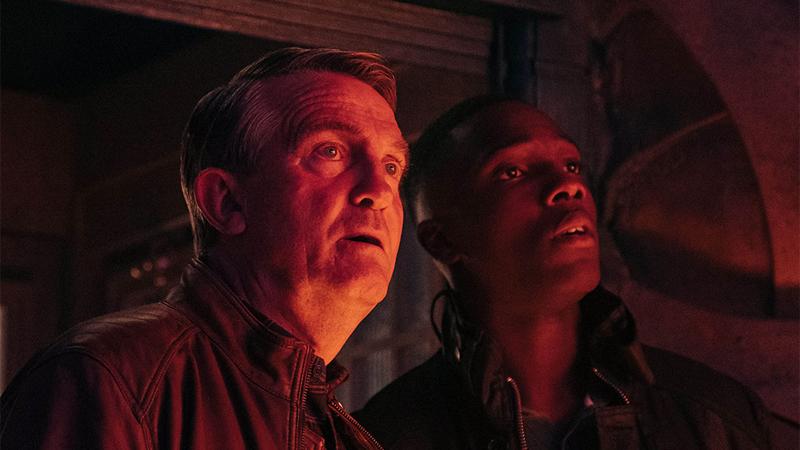
Ryan in particular is the focus of that grand change, having not just rebonded with the friends and family he had left behind to travel with the Doctor, but been given the time to reflect on his journey and how that has made him a better friend and person himself. We see it in small ways even before “Revolution” reaches the inevitable, emotional climax of Ryan and Graham’s departure from Team TARDIS, especially with how he approaches the Doctor and gets her to open up to him. There is now, having had 10 months to process and come to terms with the potential for the Doctor to not be in his life any more, an emotional and personal confidence that Ryan has developed: his time with the Doctor has changed him for the better, and he now understands and accepts that, and could only do so removed from the current moment of time-and-space monster fighting adventures. Graham has too, on a similar level; his travels with the Doctor have already allowed him to heal his relationship with Ryan, but time away from the TARDIS has also taught him the value in watching his grandson grow as a person outside of it.
Yaz then, the only companion for who the absence of the Doctor made her heart grow ever fonder, stands in an interesting contrast, because she is not yet quite so willing to accept change if it means not being with the Doctor any more. She is the one most openly hurt by the Doctor’s “late” return, the one who, unlike Ryan and Graham, stayed rooted in the Alt-TARDIS, attempting to carry on the Doctor’s protection of Earth in her stead. She, for the most part, is paired smartly with Jack for much of “Revolution,” a character who has already long been established as knowing both the pain — literally and emotionally — of having lost the Doctor, but also the deep love that comes from being a wanderer in the fourth dimension by their side.
Jack is not just here in “Revolution” as the catalyst of great change (after all it’s he that reunites the Doctor with her friends, and then helps set into motion the plan to lure the Daleks into infighting, on top of being an emotional anchor for Yaz and the others), but an example of its greatest lesson: that change is, literally and figuratively, a rebirth. The Daleks cannot see that, to their own undoing. But for the Doctor and her friends, Jack is symbolic of new opportunities, adaptations, and growth — and most crucially a bridge between the person you were and the person you become going through that process.
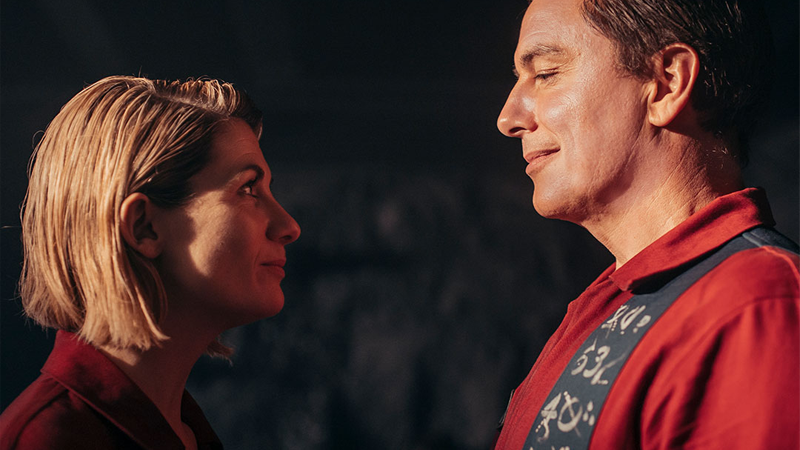
That lesson provides for Ryan and Graham at least, the drive to make their choice and stay behind on Earth once the day is saved. That lesson might even be one for Jack to re-learn a little way too, not just himself becoming at peace with the idea that the Doctor can enter and exit his life (in weird, often explosively dire ways) now instead of being so hung up on chasing the high of travelling in Time and Space again, but reuniting himself with Torchwood’s Gwen Cooper. That lesson is there for the Doctor to tackle herself now, as well, and how she will process the revelations of “The Timeless Children” will no doubt be a huge part of her arc coming into the next season of the show.
But it’s also there for Yaz, and one that she’s seemingly not quite so ready to address just yet. The haste at which she confirms her to desire to stay aboard the TARDIS as Ryan and Graham reveal their exit, her emotional willingness to let them go and give the Doctor space to grieve in the episode’s final moments, even that initial anger she felt when the Doctor realises just how long she’s been away. After the last season gave Yaz a sense of the danger that can come as part of the Doctor’s life, it seems only to have hardened her resolve and desire to remain a part of it. A change, yes, but one that takes a very interesting and different path to the examples of it elsewhere in “Revolution.”
But that’s Doctor Who, in the end, isn’t it? It’s a show that is, fundamentally, about the idea and power of change: a new time and place every adventure, a new face for the Doctor every few years, new friends and new foes and new encounters with familiar versions of both. How we all process that change, whether it’s the heroes of the show or we as its audience, is a conversation that is always ongoing, a through line woven throughout Doctor Who’s very fabric. As much as “Revolution” shows us the idea of change as the catalyst of journeys ending, it shows us that it is also an ongoing process too: one that could take the Doctor, Yaz, and us alike to some very interesting places going forward.
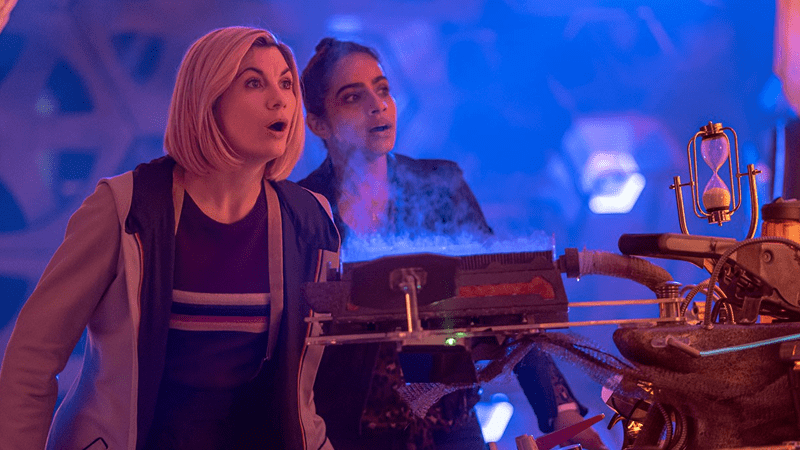
Assorted Musings
- While the sight of hundreds of Daleks swarming into the very tight doors of a TARDIS made for an incredible visual, it almost seems like a bit of a waste of an entire TARDIS to casually destroy what might be one of the last surviving time machines of Gallifreyan society at this point just to honeypot a single Dalek ship. The Doctor did say it was a nuclear option too, but given her reflection elsewhere in this episode it would’ve been interesting to see her struggle with the idea of using one of her last connections to Gallifrey to stop her greatest foes again.
- Gwen Cooper references, on TV, in the year of our lord 2021! You love to see it. As much as I would’ve liked to have seen Jack reunite with Gwen, at least we have Big Finish’s Torchwood audio dramas to hear that unfold.
- Speaking of: With Ryan and Graham getting their own psychic papers and a desire to do some good in the Doctor’s stead on Earth, when are they getting their own audio spinoff?
- Airing at the end of the episode but not part of it was the announcement that comedian and actor John Bishop would be joining the show as Dan, a new companion to the Doctor. It’s interesting: Dan seems both familiar and yet different to the kinds of companion figure we’ve seen in modern Doctor Who, with comparisons to Graham in filling in that older, working-class male figure. But also, man, it would’ve been so interesting to see Yaz and the Doctor in the TARDIS alone…together. You know what I mean.
[referenced id=”1660351″ url=”https://gizmodo.com.au/2020/12/a-brief-history-of-dalek-civil-war/” thumb=”https://gizmodo.com.au/wp-content/uploads/2020/12/24/brxbdirrtco9nqge4x39-300×169.png” title=”A Brief History of Dalek Civil War” excerpt=”In 2021, Doctor Who finally returns with “Revolution of the Daleks,” and from what we know of it so far, seems like it’s going to give us a brand new faction of human-made Daleks…that the actual Daleks are none too pleased with. But this is far from the first time…”]
